I didn’t know what to expect from this presentation — antichrist; or thoughtful, well presented arguments. I couldn’t go along with many of the proclamations that he made, but I couldn’t disagree with most of his arguments. The anarchy isn’t going away, and there’s value in it. The key is helping students to become literate in terms of today’s information landscape.
Again, this is live blogged, so please excuse typos and awkward wording.
 Andrew Keen says, “So instead of a dictatorship of experts, we’ll have a dictatorship of idiots.” He’s from England with fond memories of taking his motorcycle from library to library, where he, at one time, had 90 books checked out at one time. The speaker is Andrew Keen.
Andrew Keen says, “So instead of a dictatorship of experts, we’ll have a dictatorship of idiots.” He’s from England with fond memories of taking his motorcycle from library to library, where he, at one time, had 90 books checked out at one time. The speaker is Andrew Keen.
He want’s to talk about the book, his thinking during the writing of the book, and his thinking afterward. He approached the book wondering if the future will be Orwellian (1984) or Huxleyan (Brave New World). He use to be a journalist for a Music magazine that published about high quality music and music equipment. “The media business is about finding the talent, refining it, and selling it.”
He’s not a luddite, though he has a business card that says, “Andrew Keen, the Antichrist of Silicon Valley.” Years ago, he sipped from the coolaid, and he founded a company called Audio Cafe. Ultimately digital will triumph over paper.
Keen says that the biggest weakness of the book, is that he treats the Internet as a person. The Internet isn’t killing anything. It’s tools, and it’s controlled by people. We are killing our culture through our miss-use of the Internet. The Cult of the Amateur is about us.
Something very profound is going on. There is a cultural challenge to authority. We’re seeing a more and more personalized culture. [This is true. Kids are creating their own culture. He’s going along with what Zukkerman was talking about Internet Me.]
The individual is becoming increasingly empowered. Traditional notions of authority are fading away. People know more than their leaders. Citizenship is being replaced by consumerism.
The Internet came out of the 1960s hippies, power to the people mentality. [In reality, the Internet came from the U.S. military, but his point is valid.]
There’s no wisdom in Google. There is more search engine wisdom in this room than in all of Google, and the librarians are paid for it. Google’s service comes from it’s users use of the tool. It gets better the more we use it, but not smarter, not wiser.
He says, “Now we don’t need to rely on Thomas Freedman to know what’s happening in the Middle East.” We have the power to know through each other. No expertise needed.
Keen got an invitation to O’Reily’s FOOCamp in 2004, an unconference. Unconference is anarchy in practice. He says that everyone was blogging and podcasting, but no one was listening.
The biggest problem is that the traditional media is being undermined. The authority of experts is being undermined. People are loosing their jobs. There is value in YouTube and in the blogosphere, but it’s hard to find it. Traditional media finds and refines the talent and makes it available.
I says at the ending that, “The reality is that things are not that bad.” He’s actually optimistic now.

 Ethan Zuckerman founded
Ethan Zuckerman founded  It took less time to get from Raleigh to Toronto than it took to get through the Toronto airport. I’m sure there’s a reason. Checked in to my room and now sitting in the InterContinental Ballroom for
It took less time to get from Raleigh to Toronto than it took to get through the Toronto airport. I’m sure there’s a reason. Checked in to my room and now sitting in the InterContinental Ballroom for  I am happily (ecstatically) home … for about 12 hours. Then off again for some more conferencing. But this one is going to be special. I’ll arrive in Toronto, for the
I am happily (ecstatically) home … for about 12 hours. Then off again for some more conferencing. But this one is going to be special. I’ll arrive in Toronto, for the  I’ve been on the go pretty solidly since I left the
I’ve been on the go pretty solidly since I left the 


 It’s early the next morning (actually, it’s nearly 9:00 EST). I have one more session this morning, and then I get on a plane and head back to Philadelphia for the last day of
It’s early the next morning (actually, it’s nearly 9:00 EST). I have one more session this morning, and then I get on a plane and head back to Philadelphia for the last day of